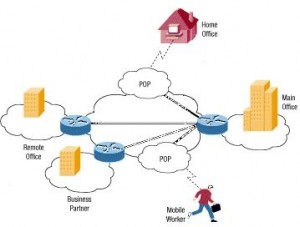 I jest, but it’s almost that bad. For example, in February, the folks at Lifehacker voted Witopia as the #1 VPN service-provider, but around that same time, Barracuda spam prevention devices decided not to let any of Witopia’s connections enter a Barracuda-protected network. Bummer. My prediction is, unless Witopia can strike a deal with them, it’ll cost them a huge percentile of their customer base. (It did me, for example.) It’s enough to make a user switch — period. But wait — some might wonder, “What’s a VPN?” Basically, it’s a tool that lets you create an encrypted “tunnel” through which your internet content can flow… until it reaches the “exit point” for whatever VPN service you’re using. For example, I’ve recently switched to StrongVPN (which Lifehacker readers voted #3, by the way), and they have exit points in 15 countries. With many services, you get to choose your exit point. At least that way, you can get your internet traffic out of, say, a country that wants to “see” your data and into the “clear” — maybe the country where you live. In StrongVPN’s case, for example, they’re based in the USA. But you can choose VPN service-providers based in lots of other countries all over the world.
I jest, but it’s almost that bad. For example, in February, the folks at Lifehacker voted Witopia as the #1 VPN service-provider, but around that same time, Barracuda spam prevention devices decided not to let any of Witopia’s connections enter a Barracuda-protected network. Bummer. My prediction is, unless Witopia can strike a deal with them, it’ll cost them a huge percentile of their customer base. (It did me, for example.) It’s enough to make a user switch — period. But wait — some might wonder, “What’s a VPN?” Basically, it’s a tool that lets you create an encrypted “tunnel” through which your internet content can flow… until it reaches the “exit point” for whatever VPN service you’re using. For example, I’ve recently switched to StrongVPN (which Lifehacker readers voted #3, by the way), and they have exit points in 15 countries. With many services, you get to choose your exit point. At least that way, you can get your internet traffic out of, say, a country that wants to “see” your data and into the “clear” — maybe the country where you live. In StrongVPN’s case, for example, they’re based in the USA. But you can choose VPN service-providers based in lots of other countries all over the world.
So which is your favorite and why? Just click “Comment” below and tell us about it! This is a rapidly-developing field; we’d better pay attention to it. Apparently, Facebook CEO Mark Zuckerberg was recently browsing — and hacked — at a public wi-fi hotspot. (This guy went to Harvard?) I guess it’s time we *all* get VPN’s. (And hats off to “K,” at our North African desk. :-) He’s the guy who brought this topic up to us this week.)










I use Hotspot Shield based on research on free VPN’s. Why? (1) It’s free. (2) It works. The downside are all the ads, but it’s free.